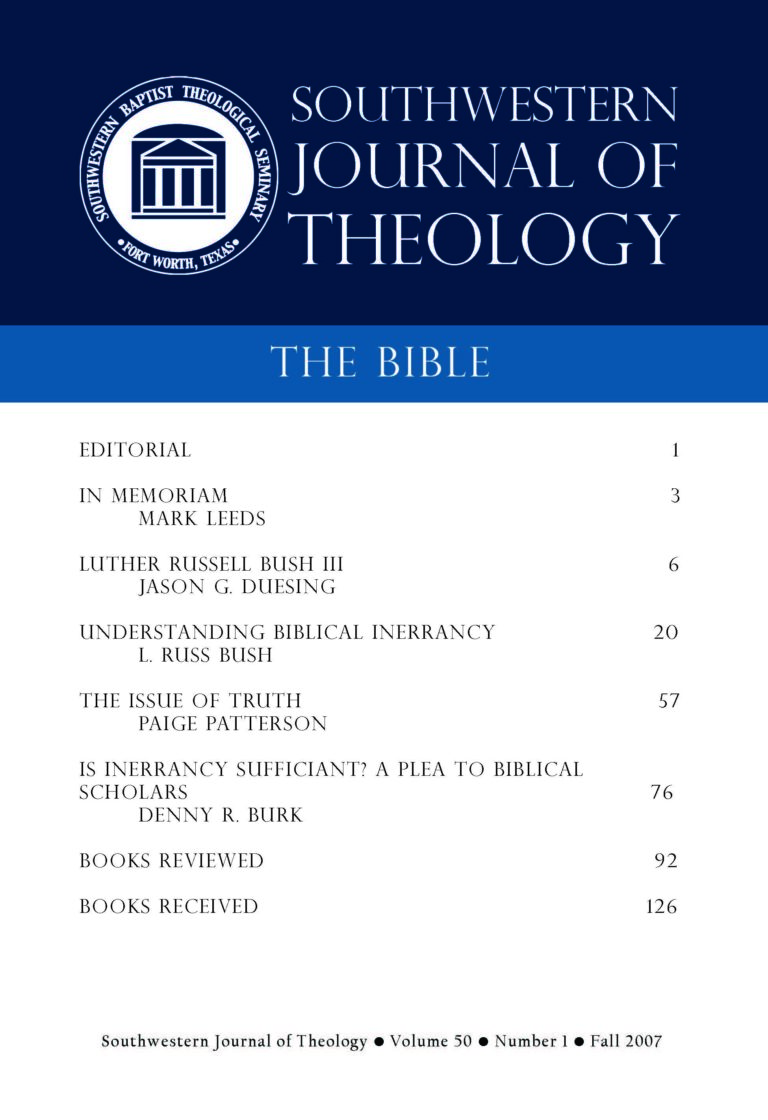
The Bible
Southwestern Journal of Theology
Volume 50, No. 1 – Fall 2007
Managing Editor: Malcolm B. Yarnell III
By Norman Klassen and Jens Zimmerman. Grand Rapids: Baker Academic, 2006. 208 pages. Softcover, $18.00.
Norman Klassen (DPhil., University of Oxford) is associate professor of English at St. Jermone’s University and Jens Zimmerman (PhD, University of British Columbia) is associate professor of English at Trinity Western University. Their book, The Passionate Intellect, was written by these two Christian professors in an attempt to encourage and guide Christian undergraduate students who, according to Klassen and Zimmerman, as a category, are facing enormous intellectual opposition to the veracity of their faith in virtually every Western university on the planet. Including the intense peer and cultural pressures to leave religion at home, the Christian who attempts to acquire an education in a university finds himself in an institution that has lost its identity (8). Thus, a second goal of the authors is to facilitate discussion and generate awareness among students, parents, and administrators of the ideological displacement from the original holistic nature of university education to its current demise into a consumer driven business enterprise.
The authors believe that recovering the medieval ideal of humanistic education, which coordinated all of the disciplines in a holistic manner toward the goal of producing good men and women for the benefit of society, will save the universities from a meaningless existence of self-perpetuation. The current secular humanism that pervades Western education has caused the institution, the products of their education, and thus society as a whole to drift toward nihilism. By recovering the original intent of university education, which entails what the authors refer to as incarnational humanism, the grip of the secular/utilitarian worldview will be released and replaced by a religiously accommodating worldview that allows the quest for truth to be open to a multitude of perspectives.
One of the strengths of the book is that it highlights the importance of worldview formation, which is an inherent part of the university. Intellectually honest universities encourage faculty and students to probe into every avenue of potential truth, which include religious truth claims. Not only has religion been fundamental to the very formation of the modern university, but it (Christianity specifically) offers a coherent set of propositions that can explain fundamental aspects of reality without contradicting truth claims from other disciplines. Though the authors do not provide an apologetic for religious truth, they at least make the argument that religion is compatible with, and does not contradict, a holistic education. The authors are right to argue that religion has been and will continue to be instrumental in preparing students to face the issues of our culture.
Another strength of the book is that it provides motivation for potential high achieving students to become a part of, succeed in, and challenge the secular universities’ guiding assumptions. Prominent lawyers, doctors, policy-makers, etc. are predominantly forged in institutions dominated by secular ideologies. The benefits of a stellar education from a high-ranking school are undeniable. With a reasonable number of Christians succeeding in various disciplines in these schools, the authors are right to note that the anti-intellectual stance of the church that has led to the marginalization of Christians from the mainstream could be reversed.
One of the weaknesses of the book is that at times the authors appear focused exclusively upon the pragmatic rewards of reforming the institution. While reform is a noble goal, and it is certainly the desire of the authors to see culture reformed through the transformation of the universities’ ideology, it can be a tempting idol. The authors do not warn of this danger. If a Christian’s primary interest becomes the improvement of this world, and not the transformation of souls for their improvement in the next, one is in a precarious spiritual spot. However, reforming the university does not preclude the opening of many doors through which the Christian perspective can receive a proper hearing, and perhaps transform many lives in the process, not only for their betterment in this world but also in the one to come.
If the authors’ vision is realized, then western universities will no longer be dominated by a secular worldview and the best and brightest of our world will acquire knowledge in the context of religious awareness and appreciation. Ultimately, this informative book is a call for Christian students to be the paradigm of academic excellence, exercising the virtues of a regenerate life to shape and guide culture through moral and academic excellence. If enough Christian students will do this now, then perhaps in the near future the commanding heights of academia could once again be dominated by the proper perspective – one that perceives reality through the lens of the gospel.





